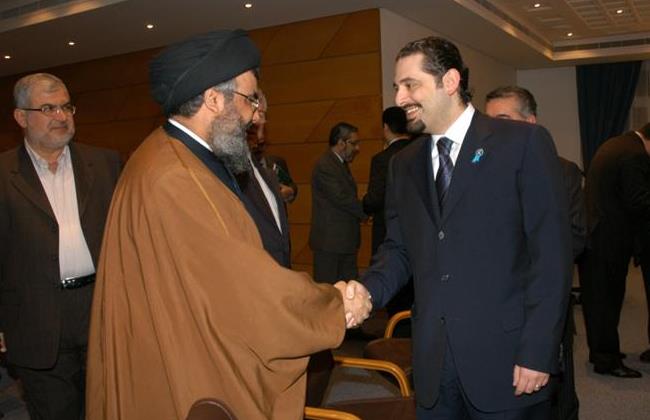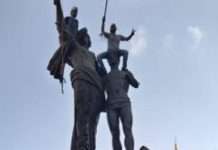Lebanon in 2015: cause for optimism or pessimism?
Venetia Rainey/The Daily Star
Dec. 31, 2014
BEIRUT: After months of uncertainty and turmoil, 2014 is finally nearing its end, and few will be sorry to see it go. From suicide bombings to a 7-month-old presidential vacuum, the second extension of Parliament’s mandate to political divisions preventing state institutions from functioning properly, Lebanon has been through the wringer this year.But what does 2015 hold? The Daily Star spoke to nine analysts and experts to find out what they think is in store for Lebanon come the new year.
A presidential election is a distinct possibility at some point next year, most agreed, although all said it was heavily linked to the regional situation, including the war in Syria, relations between geopolitical rivals Saudi Arabia and Iran, and talks to resolve suspicions over the Islamic Republic’s nuclear infrastructure.
“It remains hard to tell right now,” admitted Imad Salamey, a professor in political science at the Lebanese American University.
“Given some of the rapprochement that’s taking place between various contending regional players, particularly Iran, the U.S. and Saudi Arabia, and considering some positive signs coming out of the Iranian nuclear negotiations, and given we are about to see some talks between Future and Hezbollah, it’s very possible within five or six months we arrive at a solution to this issue.”
“The Iranian nuclear [talks] deadline in March will tell us a lot.”
The self-imposed deadline for an agreement on Iran’s nuclear capabilities is currently set for March 1.
“We are waiting for an agreement between Iran and p5+1,” agreed Hisham Jaber, the head of the Middle East Center for Studies and Public Affair, referring to the five members of the U.N. Security Council plus Germany. “I do believe if there is a breakthrough in the region, we will have a president. The president in Lebanon is not elected in Lebanon, it’s a regional and international issue. We cannot deny this, otherwise we would have one already.”
This opinion was echoed by many.
“I don’t think there will be any chance of an agreement on a president before the Iran nuclear negotiations,” said Mario Abou Zeid, a research analyst at the Carnegie Middle East Center.
He also pointed to the likelihood of a package deal covering several issues if the presidential file came unstuck: “If an agreement is reached on a president, definitely there will be an agreement on the electoral law and the makeup of the Cabinet.”
The recently launched dialogue between rivals the Future Movement and Hezbollah is a positive step, most agreed, and one that might “usher in a new momentum” on the political scene, said Randa Slim, a Lebanese-American political analyst at the Middle East Institute.
“That will lead to an agreement on a package deal that will include a new electoral law and a new consensus presidential candidate.”
Not everyone thought that a presidential election would come along with long-awaited electoral reform, however, with some saying that the idea of inviting such massive structural change was ludicrous at a time of such instability.
“It’s the No. 1 reform to be undertaken, but it requires a wide agreement … and more time, a different mood than we have now,” said Sami Nader, a professor of economics and international relations at the Universite St. Joseph and the director of the Levant Institute for Strategic Affairs think tank.
“If they agree on an electoral law, that means they have to go to elections despite already extending their terms twice. They are not ready for elections … Why? Because they are so busy with what’s inside Syria, they don’t have the capacity to manage elections here.”
What all the analysts did agree on, however, was that the two current presidential candidates, Lebanese Forces leader Samir Geagea, backed by March 14, and Free Patriotic Movement head Michel Aoun, supported by March 8, are far too controversial to be elected.
“We can rule out Mr. Geagea and Mr. Aoun for sure, because Lebanon needs a consensus figure,” said LAU’s Salamey.
Instead, most pointed to Army chief Jean Kahwagi, Central Bank Governor Riad Salameh, or, less likely, former Minister Jean Obeid as presidential possibles.
“In view of the threat posed by radical Islamic groups throughout the region, I am willing to bet that the next president will be Jean Kahwagi,” said Hilal Khashan, professor of political studies at the American University of Beirut. “Having said that, I do not think we will have a new president in 2015.”
If a president is elected, the current Cabinet would automatically be dissolved, putting the post of prime minister – the highest political Sunni post in the country – back up for grabs. So who might be in the running to take it?
“This is complicated, but my guess is that, if indeed we do have a political breakthrough … Hezbollah would be content to give March 14 this post,” said Faysal Itani, a fellow with the Atlantic Council’s Rafik Hariri Center for the Middle East. “Provided they respect certain ‘red lines’ about Hezbollah’s militia, etc.”
While a third of the analysts name-checked Future leader and former premier Saad Hariri as a front runner, the majority thought his appointment was unlikely at the moment.
“It’s not likely under the circumstances,” Itani said. “Our friendly neighbors would probably kill him. But there are plenty of Sunnis lying around. [Interior Minister] Nouhad al-Machnouk comes to mind.”
Another clear candidate for the premiership was current Prime Minister Tammam Salam, whom analysts praised as both uncontroversial and inoffensive.
“I think probably Tammam Salam or Machnouk [will become premier],” said Kamel Wazne, a Beirut-based political analyst. “Hariri is distant possibility because I don’t think he wants it. It will be him or someone he designates.”
Analysts were also quizzed on the likelihood of a range of other developments taking place in 2015, including: a new campaign of suicide bombings; Hezbollah ending its military involvement in Syria alongside President Bashar Assad; the Special Tribunal for Lebanon finishing its work investigating the 2005 assassination of former Prime Minister Rafik Hariri; a significant military confrontation with Israel; and some sort of movement on the stagnating efforts to tap Lebanon’s offshore oil reserves.
Predictions were largely mixed, but two results stood out clearly.
All agreed that Lebanon would probably see a return of suicide bombings, and all but one thought it was nigh-on impossible that Hezbollah would withdraw its troops from Syria in 2015.
“The chances of Hezbollah ending its involvement in Syria is so low, it doesn’t even register on the scale,” said Phillip Smyth, a researcher at the University of Maryland and author of the blog Hizballah Cavalcade.
“The fighting is continuing, Hezbollah is digging in its heels, and the group has been in the process of the building of local surrogates.”
A sunny picture of Lebanon’s future indeed.


















